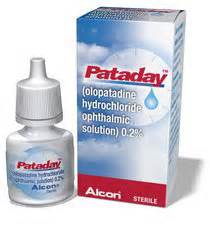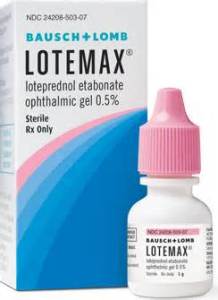Remember when it was 5 degrees outside and there was 14″ of snow on the ground? If you’re like us, you were pining for warmer days and sunshine.
Well, Spring has sprung in Paducah, and with it comes one major downside: allergies. If the pollen isn’t enough to get you going, the fresh-cut grass and lack of rain are sure to push you over the edge. Itching watery eyes that look red and swollen are a hallmark sign of ocular allergies.
Eye allergies, also known as allergic conjunctivitis, is a pervasive problem in Paducah. Good news: There is a fix! Before we talk about how to fix it, let’s look at the problem in a little more detail.
The Problem
Allergic conjunctivitis is triggered when the ocular surface comes into contact with something that you are allergic to, called an allergen. Allergens can be anything from pollen and dust to pet dander or cosmetics.
When an allergen touches your eye, an immune response is triggered. The blood vessels in your eyes dilate and become engorged with blood, causing your eyes to look red. The reason they dilate is to allow faster response by immune cells. The biggest culprit for itching is histamine.
Histamine is released from a “pod” called a mast cell. Mast cells are embedded on the front surface of your eye and, when needed, release histamine. Rubbing your eyes can actually cause these “pods” to rupture and release even more histamine. So don’t rub your eyes!
In an allergic reaction, the conjunctiva becomes swollen with inflammatory cells and fluid and your eye waters in an attempt to flush out the allergen.
The Fix
If you get a visible particle in your eye (like a small piece of grass or a cat hair), you should immediately flush your eye with water and see your optometrist.
However, most eye allergies are caused by microscopic allergens. There are two goals of treatment: deactivate histamine and calm existing inflammation.
Stopping histamine
Antihistamine eye drops are our go-to for stopping histamine. There are excellent prescription drops like Pataday and Lastacaft that do an exceptional job of long-term histamine control. Better yet, these drops are once-a-day use!
Calming Inflammation
In acute or severe allergic reactions, we can use a mild steroid to calm inflammation. Steroid eye drops are commonly prescribed to treat this. In addition, over-the-counter steroid nasal sprays, such as Flonase, do a great job of quickly calming mild-moderate eye allergies. For severe cases, an eye drop is the way to go.
Need relief? Dr. Montgomery performs allergy-focused exams to get you the relief you need quickly, without a comprehensive exam. Make an appointment today and feel better soon!
-Dr. Montgomery
Dr. Canaan Montgomery is an optometrist in Paducah, Kentucky. His practice, West End Eye Care, focuses on eye disease, contact lenses, and pediatric eye care.


